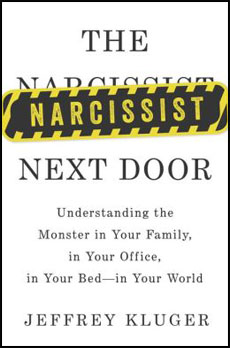"The lack of interest in intimacy and caring is a predictable part of the narcissistic package, but it also seems a little surprising. Even a narcissist who always has one eye on the door and one foot out of it still wants to enjoy the relationship while it's going on, and intimacy and caring are just other ways of describing a partner who is concerned with you, will attend to you and listen to you — all big items on a narcissist's bottomless list of needs.
"But intimacy does not come free. It takes work to get another person to invest energy and empathy in you when you're sick or sad or disappointed or preoccupied, and that other person requires a measure of reciprocity in order to get to that point at all. Narcissists have no appetite for the quid pro quo. Intimacy also implies a certain lack of freedom, a limitation not just on your license to flirt or cheat, but even to gather an audience and work a room in the way you're accustomed. That constant foraging for attention may be a key source of the narcissist's emotional nourishment, but it's hard to indulge it with a close mate who, after a certain time, expects to sit down together at a dinner party or, at least sometimes, move through a crowd along with you — one half of a joined team to whom you devote some of your focus and with whom you share some of the attention that comes your way.
" 'For narcissists, every moment is perceived as an opportunity to be recognized and admired,' says Aaron Pincus, psychologist and director of clinical training at Penn State University. 'After a while, they don't know when to do it and when not to do it.' That, clearly, leaves little room for a mate at your side and the confinement of closeness.
"Finally, and a little poignantly, there's the central paradox of many narcissists — at least the mask-model variety: They don't think terribly much of themselves to begin with, and that plays a big role in their avoidance of intimacy. At some frightened level, their compulsive seductions are all a desperate, frenzied, even self-loathing pose, and the closer they get to another person, the better the chance that person has of finding them out. When that happens, it's the narcissist who may be the one who gets tossed over, the narcissist who's found lacking. That kind of experience is hard enough for the healthy, grounded non-narcissist to take; for the narcissist, whose self-adoration was a sham in the first place, it can feel like death.
" '[It] is like being hollowed out, mentally disemboweled or watching oneself die,' wrote Israeli author Sam Vaknin in his book Malignant Self Love, about how the narcissist experiences rejection. 'It is a cosmic evaporation, disintegrating into molecules of terrified anguish, helplessly and inexorably. . . . The narcissist will do anything to avoid it.' That doesn't sound pretty, and it can't be fun. If remaining at arm's length from a partner can help you avoid such an experience, it seems like a reasonable precaution to take."
